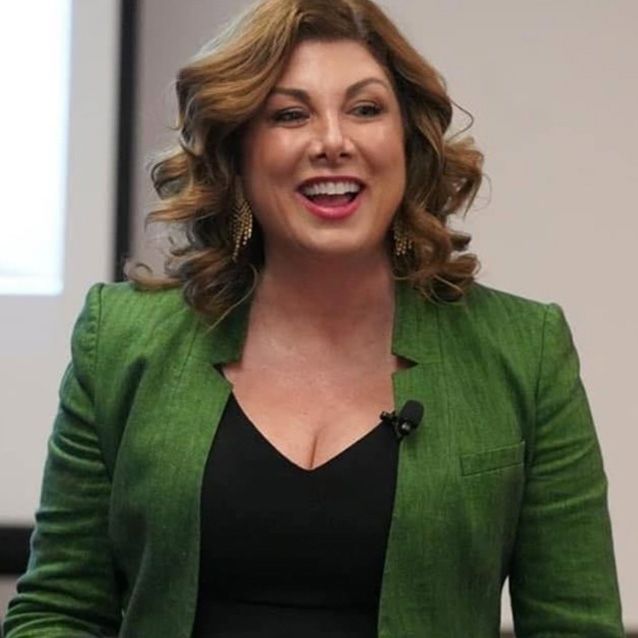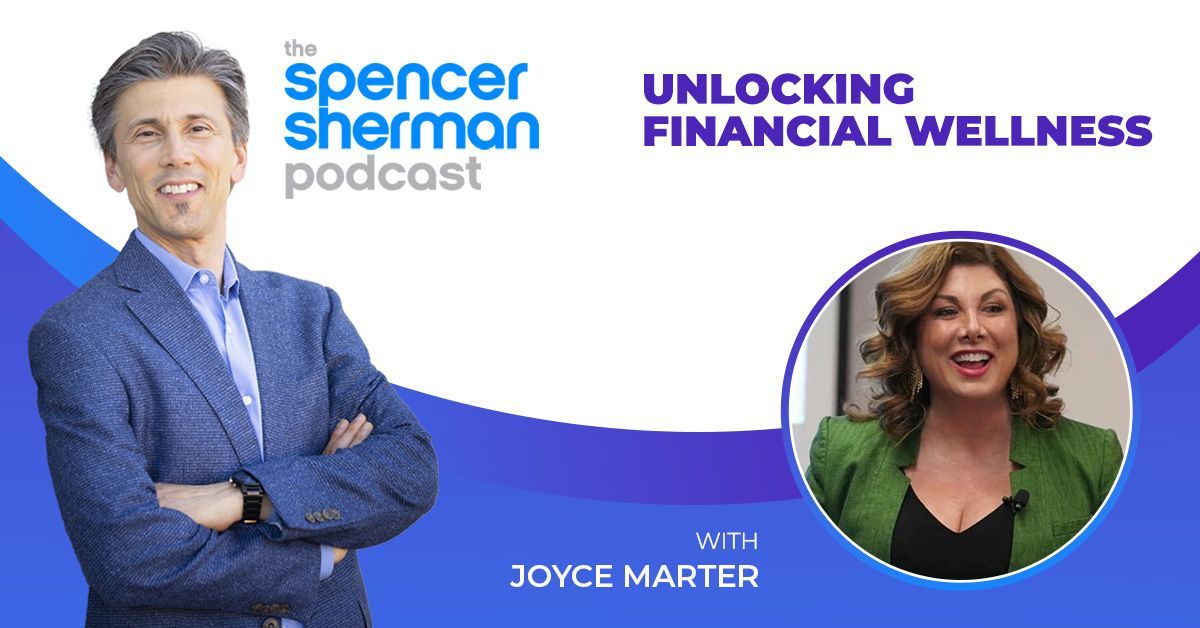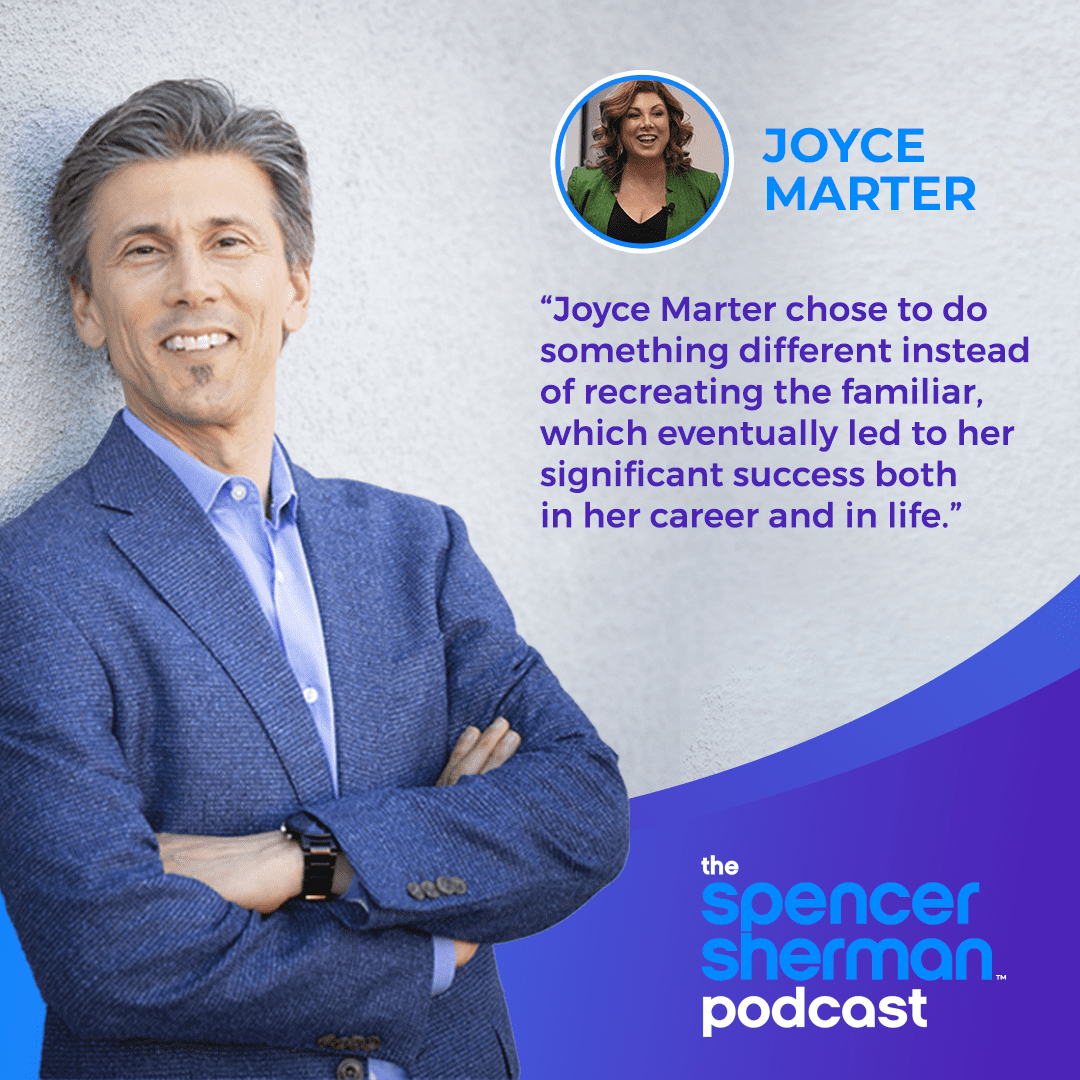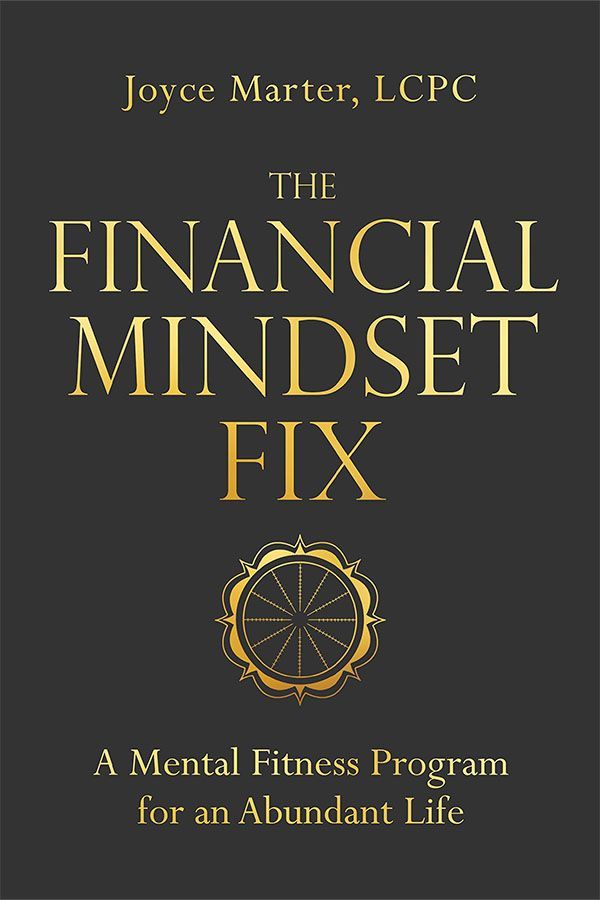Achieving financial wellness does not only benefit your wealth building journey. At its highest points, it also leads to a healthier mind and body. Spencer Sherman sits down with psychologist and author Joyce Marter who discusses how our relationship with money directly impacts our perspectives, lifestyle, and emotions. She explains how wealth is very much connected with a person’s self-esteem, highlighting the necessary work to avoid having a deflated view of oneself. Joyce also talks about the right way to deal with stress related to your money and how to turn them into positive financial drivers.
---
Listen to the podcast here
Unlocking Financial Wellness With Joyce Marter
I'm here with Joyce Marter. Joyce is a world-renowned psychologist, author, and international speaker. I hate to use the word guru, but she is someone who has been working with money and the psychology of money for as long as anyone and has had so many great insights into this field. What I want to say is that I love the fact that I'm in this field and that it's getting so much attention. People are understanding that this field of money is not so much about how much we know about money. It's something to do with that. Knowledge is somewhat important, but it has so much more to do with our relationship with money. Our thoughts, emotions, and beliefs from childhood about money often seem, to me, to cause our successes and failures with our finances and cause our stress or ease with our finances. Joyce, I want to welcome you here. How are you?
I'm doing well, Spencer. Thank you so much for having me and for the kind introduction.
I know I sound crazy when I get so passionate about this field, but it has to do with my background that money was a big topic in my family. It caused a lot of pain and suffering. What I've become aware of is that this emotional work and emotional intelligence work that I've done on money has helped me undo so much of that suffering to have a whole different way of being with money than my family. I've gotten excited about sharing that with others. I know that's part of you as well from some of the things you shared with me.
I wonder if you could begin by giving us a sense of why you're passionate about this field. I might have shared with you that my whole family had a major breakup over a money issue between my father and his sister. We lost many family members for decades because they could not speak about money. To me, a field that has such darkness also pulls so much lightness.
It's such an unexpected other thing that excites me. I don't know about you, but this territory is so unexplored. We're pioneers. To boost things around money, you're not supposed to be talking about it. Here we are and we're talking about the topic you're not supposed to talk about. I love the fact that you're here. Feel free to start us out with a little background about yourself. Not many psychologists are even interested in touching money, let alone making it the forefront of what they do. Let's start with that to keep clueing you in. Go ahead.
I've been a licensed psychotherapist for many years. I am super passionate about de-stigmatizing mental health issues and promoting awareness and access to care. Like many therapists, I came into the field because of my own issues. I struggled with anxiety and self-esteem issues. When I got into graduate school, very smartly, at Northwestern, it was recommended that we all get into our own personal therapy and I found it transformational. I'm also an entrepreneur. I founded, built, and sold Urban Balance, which is a national outpatient mental health company. I started the business with $500 and $50,000 of student loan debt.
I don't know if you know this, but we therapists specialize in our own issues. I suffered from tremendous financial anxiety. I ended up in cashflow hell. The bigger that my business got, the more money was outstanding from insurance payers. It was manageable when the business was smaller, but as it grew, it was hundreds of thousands of dollars that was outstanding. I dealt with insomnia and panic attacks. I didn't know how I was going to pay my rent and my staff on time.
In your mind, you were even becoming more successful, but the anxiety was going through the roof.
What's fascinating is if there's anything I've learned as a therapist, it's that we all unconsciously repeat what's familiar until we become aware and choose something better. I recreated my family of origin experience. My father was born during the Great Depression and understandably had a scarcity mindset around money even though he worked super hard, got his Harvard MBA, and was an executive in the automotive industry.
Everyone unconsciously repeats what’s familiar until we become aware to choose something better.
When I was an adolescent, my father was laid off during the automotive recession for many years and dealt with clinical depression and tremendous money anxiety. It was confusing for me as a kid because we lived in a nice home and lived a nice lifestyle, yet there was the shame and secrecy that inside our house, there was fear that the money was going to run out.
It is some of what you had with your business also.
Exactly. It is the same thing. Like any good therapist, I practiced what I preached and got myself back into therapy. My therapist said, “What does money mean to you? What do you think when I say the word money?” I said, “I think of stress.” She said, “No wonder you make it go away.”
Take that in, everybody. Let's accept that for a moment. That awareness is powerful. We don't want to admit certain things, but the fact that you were able to admit that probably led to it getting freed up for you. What great feedback you got from this other therapist that if it's causing stress, no wonder you're making it go away.
In my own practice, I've had this enormous blessing of learning from thousands of clients that I've treated over many years of clinical practice and reaping their wisdom. I started to notice that as my clients made progress in therapy, they started to earn more money. Their client was coming in reporting raises, promotions, and starting their own businesses and side hustles. I thought, “Why is this happening? We are not even talking about money at this point in my career.” It was because as we work in therapy, each of us is working on our self-esteem and our self-work. As we feel more confident, we put ourselves out in the world differently. We expand our comfort zone, advocate for ourselves, negotiate, and take risks we might not have made previously.
I love that. Self-esteem is very connected from what I hear you saying to money. Maybe that's going to lead to my next question, and maybe that's part of the answer that I'm sure a lot of people here are interested in. You've worked with hundreds and thousands of clients, students, and people who are attending your speaking engagements and workshops over the years.
I'm wondering what you've noticed about the people who hear what you're saying or come to your sessions or whatever and nothing changes in their lives, and then there are the people that come to your sessions and attend your talks and something significant happens in their lives. I'm wondering if you can speak to some of the differences. What leads someone to take your guidance and become a lot more successful, less stressed, more at ease with money, etc.?
I would say a few things, which are embracing your worth and accessing support.
Let's start with that first one, embracing your worth. Tell us about that.
I believe that worth is on a spiritual or soul level. If you believe in mind, body, and spirit, our soul is our essence. We're all innately worthy and deserving. Our ego is our mind. We all have egos as part of the human condition. We can be on a continuum from feeling superior to others to feeling inferior. Healthy self-esteem is in the middle. It's where we recognize our gifts and our strengths, but also our areas of deficit and needed growth and development. The big difference is when people embrace their worth and they take responsibility and the reins. I have had a lot of clients spend a lot of time in my sessions talking about other people. That could be their partner, boss, or parents. I've done it myself. My mother starred in my first round of therapy.
That was very revealing because you didn't say that you starred. You said your mother starred. It's like, whose therapy session is it?
It wasn't until I had a great therapist, Arlene Englander, who said, “What about you? What are you contributing?” She had me look at myself and my own behaviors that were causing me suffering, unhappiness, or financial stress and limitation.
This part about worthiness, I want to make sure we all grok this. It is hearing this balanced view of ourselves that we are not deflated but we're also not inflated. We see our goodness, but we also recognize some of our limitations or some of the areas of challenge or growth for us. To those of us who are reading, what would you say to the people who have a deflated self-view of themselves? What's needed for those people?
From passive or passive-aggressive communication to assertive communication, that demonstrates respect for yourself and others. When you set healthy boundaries with others, that demonstrate respect for yourself, including financial boundaries, whether that's with your employer, your family members, your kids, or your partner.
Can you give us a boundary that a lot of us may not be good at? You can suggest to us a boundary. Maybe you're going out to lunch. Who's going to pay the check? Maybe someone asks you to help them with something and you say, “I only have this much time,” rather than unlimited. Maybe you can give us a little to do around boundaries because that's so important.
I'm a recovering people pleaser, so I've had to learn to say no and set healthy boundaries. It's important to get clear about what your needs are, to value yourself, to practice self-care and self-love, and to make sure that you're not overextending yourself or allowing your boundaries to be compromised. When you get clearer on that line, then it's your job to take care of yourself by communicating that in a way that is kind, diplomatic, and respectful of yourself and others. You can use iMessage to say, “I'm on a budget. I'm wondering if we could split the check.”
Learn to say no and set healthy boundaries. Get clear about your needs and practice self-care.
For a lot of us, including me, that's not easy to speak to that issue even though it seems so simple. You want to have a nice time at lunch. You don't want to bring up something yucky or messy like money. Is there a way to do it where I could say, “I'm uncomfortable. I'm nervous about saying this, but I am on a budget now. Could we split the check at the end?” Do you have any suggestions on how to make that easier or more fun?
There are two things. One of them is to recognize that it's shame and fear. You're embarrassed that you're dealing with some money struggles or that you can't afford what your friend can afford. When we share whatever we're feeling vulnerable about, it shines the light on that. Usually, it invites other people to do the same. Oftentimes, we compare our insides to other people's outsides. We imagine they're not having financial concerns or struggles, but we don't know that.
It is also being proactive. For example, a friend and I realized we always go out for these nice dinners. We're both trying to work not only on our financial health but our physical health, so we decided instead to go for walks together. It saves us hundreds of dollars. We burn calories and have a ton of fun, and we're in nature.
You burn calories instead of cash. I love what you said about how when you're at that meal, it's an act of vulnerability. When we feel shame around sharing that, “I'm on a budget now. I want to know if we could split the check at the end,” or something like that, it's a way to create a connection with someone. That's what I've seen. It always feels so scary, but once I do it, it almost always feels amazing. We have a high probability of success when we're vulnerable in speaking about ourselves using an I statement. It is like, “I'm having some issues with my finances right now. Can we split this check today?” It lets everyone exhale.
It doesn't even have to be framed in a negative way like, “I'm having issues.” It could be, “I am working on my financial health and wellness.” I would like us to be cognizant of that when we select the restaurant, the plans, or whatever it may be.
It could be, “I'm working on my financial health,” or, “My spouse and I are saving up for a house. I need to be conscious of how our spending. Can we split the check today?” or, “Can we go to a less expensive restaurant?” It’s not after you've gotten into the restaurant but as you're deciding. It takes some boldness. Many people have told me that they end up going out with a friend of theirs to a 4 or 5-star restaurant because they don't know how to speak to it. What you are suggesting is to frame it in a neutral or positive way.
Also, it is to practice self-compassion. Having financial challenges is part of the human condition. We're all works in progress. None of us is perfect and our challenges are part of our learning opportunities, our growth, and our healing. I know I dealt with a lot of financial shame. It wasn't until I was in that cashflow hell situation. That broke me open. I lost my business partner who was one of my best friends. She said,
“I can't deal with the stress anymore. I'm leaving the company and our relationship,” which was very painful.
That caused a big change in me to open myself up to ask for help and support. Instead of pretending like everything was okay, I told my staff, “I'm so sorry, but I screwed up. I need help,” and help came out of the woodwork. I talked to friends and family. It was my neighbor that recommended a business valuation. That's what changed my whole trajectory. Together with my leadership team, I was able to transform the business and successfully sell it for more money than I would've ever imagined making in a lifetime.
It was a precursor. That was you having the courage to say, “I need help.”
It was a big part of it. Fear and shame prevented me from seeking the business and financial consultation that I needed because I was afraid somebody was going to tell me that my business model didn't work, that my dream wouldn't come true, or I was embarrassed that I had so much. It was anxiety-provoking to talk about that with somebody.
For all of us reading, what's a tail sign when fear or shame is keeping us from taking a wise financial action?
You and I both practice mindfulness and meditation. It is going inward and checking in with your body. If you're not breathing, you're feeling muscle tension in your body, or you're feeling tension, worry, stress, anxiety, and gripping, those are all indicators that you're in a fear state rather than in a flow state. Money has flow like breath and love. It ebbs and flows. It goes in and out. When we embrace our gifts and align them with a need in the world to the greatest extent possible, we are in this flow state that welcomes an abundant life.
That's beautiful. Much of it is acknowledging what's happening in the body and being true to what's arising. That led you to be able to ask for help, and then all this magical stuff happened from there. The business sold for so much more than you had imagined.
I started meditation and yoga around that time.
You mentioned that to me. That was a big part of your journey.
When we meditate and do mindfulness practices, we connect with our essence, our inner light, and our inner fire. We can detach from the ego. We can expand our lives spiritually, emotionally, relationally, and financially.
When we meditate and do mindfulness practices, we connect with our essence, inner light, and inner fire.
Yes. Thank you.
Here is a book, a script, or a guide, if you will, for having a whole new way of being in your life in general but especially being with money. Is there anything else you want to say about what this book could do for you?
My hope is that it's transformative. I've heard amazing feedback from readers who've worked the program. Some couples have worked it together, which is amazing because, for many of us, money and relationships are complicated because we each have our money stories. My hope is that it's healing for people. I'm It was book award season and the book won nine awards. I hope that will reach more people.
Congratulations.
Thank you so much.
That's fantastic. I also want to read out a comment. Catherine Sullivan who is a neuroscientist suggests changing the term mental health to brain health with recognition that the brain develops from 18 and under, which is brain development to 19 to 50 of optimum brain health to 50-plus until brain death. You’re saying, Catherine, that the brain keeps developing. The less stress, the longer the state of optimal brain health. Do you have any response there to that?
I love the idea of calling it brain health because there's less stigma around that. There's a huge component to mental health that is biochemical, genetic, and neurological. Also, the connection between stress and brain health or mental health is very real. We were in a stress epidemic even before the pandemic and the pandemic added fuel to the fire. Catherine's point is about developmentally appreciating where we're at. I know in my own life, I've been conscious of reducing my stressors and simplifying my life. I recognize that I want to live a long healthy life. Stress is a component of that, so I want to reduce my stress.
We're not going to get stressed down to zero. There's some stress that's healthy for us. If you're in a frictionless environment with nothing to do all day, that doesn't lead to a happy and fulfilling life. If you have a hammock and great food, we need more than just a hammock. Maybe you can say something about how you distinguish the good from the bad stress, especially in terms of one's finances.
If you're having a fight, flight, or freeze response or flee or fawn, which is the other one, that's an unhealthy and unadaptable response to stress. It is recognizing that and then getting back to mindfulness practices so that you can become more aware of what is causing you stress. Is it internal? Is it the way that you think about things?
Cognitive behavioral therapy can be extremely helpful with that. Is it past trauma that needs to be healed and resolved? Is it current relationships that need to be re-examined or a toxic workplace or job? What do you need to do to empower yourself to emancipate yourself from those situations that are causing you stress and unhappiness?
How do you know if it's good stress or healthy stress?
Good stress is motivating and energizing. It keeps us on task. Bad stress can cause us to freeze and feel paralyzed, feel fear, and feel anger. It negatively impacts our mental health in terms of depression and anxiety, eating disorders, or substance use disorders.
I know there's this quote of yours that I love. I hear this from so many people who tried a lot of things to change their financial situation. They are like, “It seems to change a little bit and then it reverts back to the way it was. I'm having trouble making sustainable change.” You have this quote, “Until we keep recreating the familiar and until we become aware, we choose something better. We choose something different.”
I wondered if you could speak to that, and then we'll do a little closing out here because we're getting close to time here. I know that change is so possible and also a little elusive for many of us. You're pointing out that there's something attractive to the familiar. We keep recreating the familiar and become aware. We choose something different or better. Maybe you can say something about that. How do you end up doing that? How do you put that into practice?
We can all end up on a gerbil wheel of work and household responsibilities. That's not a conscious way of living. It is choosing to step off of the gerbil wheel and thoughtfully examine your life and what you want for yourself. In therapy, they call it the miracle question. If you had a magic wand, what would you like your life to look like?
My favorite thing as a therapist is mirroring back everything amazing about my clients and empowering them to think bigger and aim higher. It is creating that vision that's scary or beyond what you ever believed was available to you. When you create that vision, there's discomfort and growth. There's putting yourself out there. There's failure. Failure is a huge part of success. It's a willingness to fail, to have setbacks, and to be bumped around, if you will, in the process of learning, growing, and evolving. It also requires support and accountability because, without support and accountability, we often revert back to our old behaviors.
I love what you said that accountability is so key. It is having an accountability buddy or an ally because sometimes, an accountability buddy sounds heavy. It is having someone in it with, either a professional, a friend, or a colleague. You said something about setbacks. That's so good because I was brought up with this idea that if I'm doing it right, there are not going to be any setbacks in life.
It doesn't make any sense at all.
It doesn't make any sense because everybody has setbacks. The most successful people in life have had many setbacks. It is to see those as part of the journey and something to be learned from, not something that should tell us necessarily to quit.
In fact, in my book, there are some studies that the temptation to quit is the strongest right before great success. It is about perseverance and resilience and moving through that. Those challenges are opportunities for learning and growth. Progress is not linear. We all have setbacks. It is how we learn from those and how the willingness to get back on the horse and try again helps us succeed and persevere.
The temptation to quit is the strongest right before success.
That is so good. That is so well said. I love all this. You are amazing. I want to keep talking to you and have you back. It's so good. You're so full of so many good insights and experiences. It's all in her book. It's in her other offerings. Check out her website, which is
Joyce-Marter.com. Is there anything else you'd like to share about yourself or your offerings?
I'm very excited that you and I are going to be doing The Inner Dimensions of Mastering Money course together through Sounds True this fall 2023. I know that's going to be marketed shortly. I hope folks will join us both there.
That is an amazing program. It's so layered. Sounds True and Tami Simon has produced such a rich, nuanced, and very in-depth money program that operates on so many different levels. There's hardcore financial education in the program. There's hardcore psychological guidance. There's a lot of spiritual. Someone started doing more of the spiritual side, looking at ancestral patterns. Whatever your money issue is, you've got four people leading the program, including me and Joyce. We're all coming at it from a different angle because you never know what's going to resonate with each person on each issue. It was brilliantly put together. You'll find in the
Sounds True website
The Inner Dimensions of Mastering Money.
I am very excited about that. It is an honor to be working with you and others. It will be great.
Thank you, Albert, for your beautiful comments. Catherine, thank you so much for bringing your neuroscience wisdom here. Thank you, Arvin, Omar, and Zorba. Thank you, everyone. This is going to be an incredible recording that you'll want to share with your friends and colleagues at work. You could find out more about me at
Spencer-Sherman.com. It has been such an honor and a pleasure to chat with you and learn from you. Thank you so much for the gifts that you're giving this world and to all of us. Thank you so much for your work.
Likewise. Thank you.
Take care, everybody. I'll see you soon. Be well. May you all flourish with your life and finances. May we all flourish and many beings benefit from all this work that we're doing with ourselves around money. Thanks again.
Thank you.

As a licensed psychotherapist for over 25 years, I’ve counseled thousands of clients to take an honest look at themselves and to make brave changes to welcome greater health, wellness, and prosperity. It has been a deep and profound honor to learn from my clients and their experiences, which has carved wisdom in my spirit which I feel called to share with others through my speaking and writing.
As a globally renowned public speaker, I’ve worked with organizations, businesses, and corporations of all sizes, across all industries, to destigmatize mental health issues, facilitate corporate wellness, and promote work-life balance and mental and financial health.
“I am a passionate and trusted advocate for destigmatizing mental health issues and financial struggle and providing tools for facilitating healing, recovery, and cultivating an abundant life filled with mental well-being, physical health, loving relationships, work-life balance, and financial wellness.”
As an internationally published author, I am the go-to expert on ways to improve your financial well-being by focusing on your psychological and relational issues around money. I’ve shared what I’ve learned throughout 25 years of working with clients and on my own personal journey in my latest book, The Financial Mindset Fix.
As a successful entrepreneur, I have a deep understanding of the importance of fostering employee wellness, conscious leadership, and financial stability. I built my business, Urban Balance, with the mission of destigmatizing mental health care and making therapy affordable and accessible by accepting most insurance and providing sliding fee services. In 2017, I profitably sold Urban Balance to Refresh Mental Health so that I could focus on my writing and speaking and share my message with a larger audience. When we have more, we can help more.
As a philanthropist, I care deeply about saving our planet, advocating for social justice, increasing access to mental healthcare, and contributing to the greater good. For this reason, Joyce Marter Enterprises, Inc. is a monthly donor to the following organizations: Environmental Defense Fund, American Civil Rights Union, National Alliance on Mental Illness, and the Tanzanian Children’s Fund. Additionally, 10% of my talks per year are provided on a sliding fee or pro bono basis.










